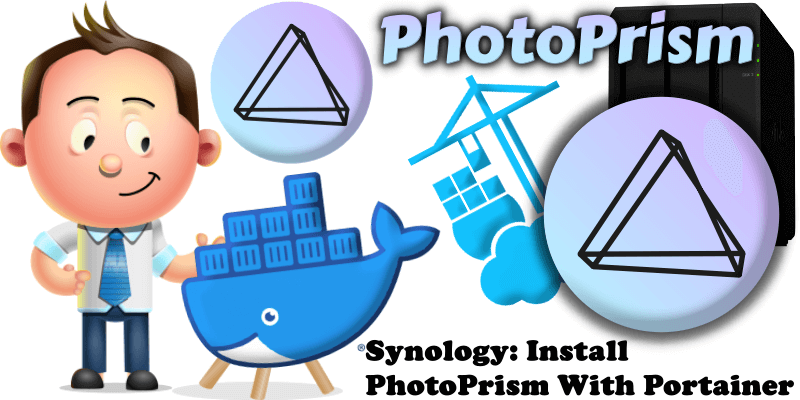
My previous guide for PhotoPrism involved the use of Task Scheduler. Today I’m offering a great alternative for installing the latest PhotoPrism version via Portainer. PhotoPrism is a privately hosted app for browsing, organizing, and sharing your photo collection. It makes use of the latest technologies to tag and find pictures automatically without getting in your way. Say goodbye to solutions that force you to upload your visual memories to the cloud! In this step by step guide I will show you how to install PhotoPrism on your Synology NAS using Docker & Portainer.
STEP 1
Please Support My work by Making a Donation.
STEP 2
Install Portainer using my step by step guide. If you already have Portainer installed on your Synology NAS, skip this STEP. Attention: Make sure you have installed the latest Portainer version.
STEP 3
Go to File Station and open the docker folder. Inside the docker folder, create one new folder and name it photoprism. Follow the instructions in the image below.
Note: Be careful to enter only lowercase, not uppercase letters.
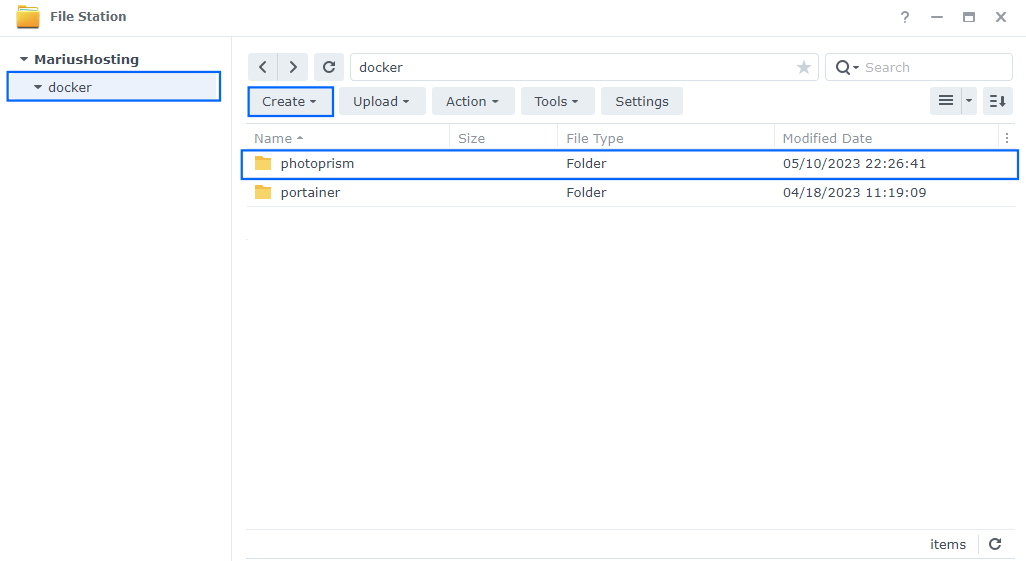
STEP 4
Now create four new folders inside the photoprism folder that you created at STEP 3 and name them db, import, originals, storage. Follow the instructions in the image below.
Note: Be careful to enter only lowercase, not uppercase letters.
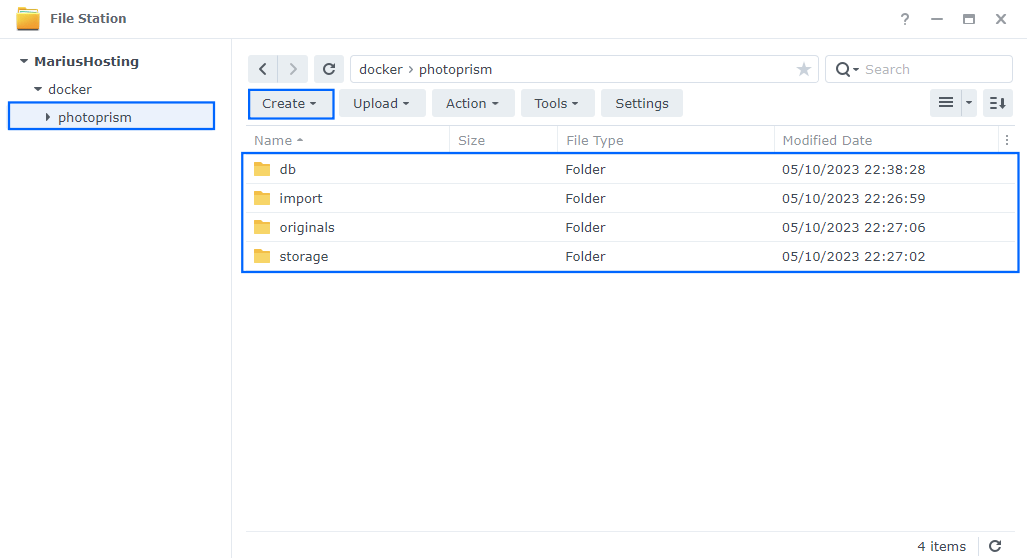
STEP 5
You can start to populate your originals folder that you have previously created at STEP 4 with your own photos.
STEP 6
Log into Portainer using your username and password. On the left sidebar in Portainer, click on Stacks then + Add stack. Follow the instructions in the image below.
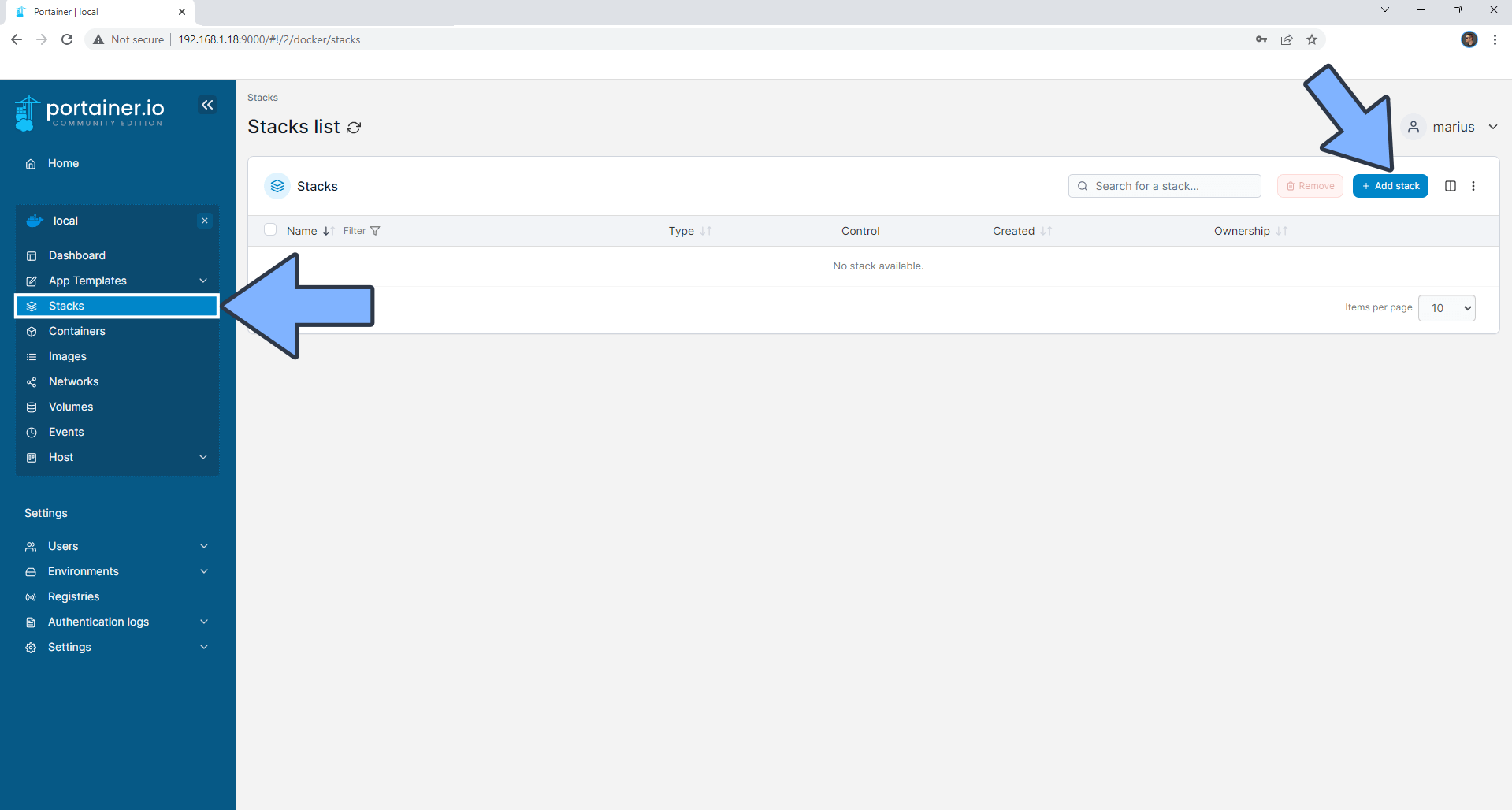
STEP 7
In the Name field type in photoprism. Follow the instructions in the image below.
services:
db:
image: mariadb:11.4-noble #LTS Long Time Support Until May 29, 2029.
container_name: PhotoPrism-DB
hostname: photoprism-db
mem_limit: 1g
cpu_shares: 768
security_opt:
- no-new-privileges:false
- seccomp:unconfined
- apparmor:unconfined
volumes:
- /volume1/docker/photoprism/db:/var/lib/mysql:rw
environment:
TZ: Europe/Bucharest
MYSQL_ROOT_PASSWORD: rootpass
MYSQL_DATABASE: photoprism
MYSQL_USER: photoprism-user
MYSQL_PASSWORD: photoprism-pass
restart: on-failure:5
photoprism:
image: photoprism/photoprism:latest
container_name: PhotoPrism
hostname: photoprism
mem_limit: 6g
cpu_shares: 1024
security_opt:
- no-new-privileges:true
- seccomp:unconfined
- apparmor:unconfined
user: 0:0
healthcheck:
test: wget --no-verbose --tries=1 --spider http://localhost:2342
ports:
- 2342:2342
volumes:
- /volume1/docker/photoprism/import:/photoprism/import:rw # *Optional* base folder from which files can be imported to originals
- /volume1/docker/photoprism/storage:/photoprism/storage:rw
- /volume1/docker/photoprism/originals:/photoprism/originals:rw
# - /volume1/docker/photoprism/family:/photoprism/originals/family:rw # *Additional* media folders can be mounted like this
environment:
PHOTOPRISM_ADMIN_USER: marius
PHOTOPRISM_ADMIN_PASSWORD: mariushosting
PHOTOPRISM_UID: 1026
PHOTOPRISM_GID: 100
PHOTOPRISM_AUTH_MODE: password
PHOTOPRISM_SITE_URL: http://localhost:2342/
PHOTOPRISM_ORIGINALS_LIMIT: 5120
PHOTOPRISM_HTTP_COMPRESSION: gzip
PHOTOPRISM_READONLY: false
PHOTOPRISM_EXPERIMENTAL: false
PHOTOPRISM_DISABLE_CHOWN: false
PHOTOPRISM_DISABLE_WEBDAV: false
PHOTOPRISM_DISABLE_SETTINGS: false
PHOTOPRISM_DISABLE_TENSORFLOW: false
PHOTOPRISM_DISABLE_FACES: false
PHOTOPRISM_DISABLE_CLASSIFICATION: false
PHOTOPRISM_DISABLE_RAW: false
PHOTOPRISM_RAW_PRESETS: false
PHOTOPRISM_JPEG_QUALITY: 100
PHOTOPRISM_DETECT_NSFW: false
PHOTOPRISM_UPLOAD_NSFW: true
#PHOTOPRISM_THUMB_LIBRARY: "imaging"
PHOTOPRISM_SPONSOR: true
PHOTOPRISM_DATABASE_DRIVER: mysql
PHOTOPRISM_DATABASE_SERVER: photoprism-db:3306
PHOTOPRISM_DATABASE_NAME: photoprism
PHOTOPRISM_DATABASE_USER: photoprism-user
PHOTOPRISM_DATABASE_PASSWORD: photoprism-pass
PHOTOPRISM_WORKERS: 2
PHOTOPRISM_THUMB_FILTER: blackman # best to worst: blackman, lanczos, cubic, linear
PHOTOPRISM_APP_MODE: standalone # progressive web app MODE - fullscreen, standalone, minimal-ui, browser
# PHOTOPRISM_SITE_CAPTION: "AI-Powered Photos App"
# PHOTOPRISM_SITE_DESCRIPTION: ""
# PHOTOPRISM_SITE_AUTHOR: ""
working_dir: "/photoprism"
restart: on-failure:5
depends_on:
db:
condition: service_started
Note: Before you paste the code above in the Web editor area below, change the value for TZ. (Select your current Time Zone from this list.)
Note: Before you paste the code above in the Web editor area below, change the value for PHOTOPRISM_ADMIN_USER. Type in your own username. marius is an example for a username.
Note: Before you paste the code above in the Web editor area below, change the value for PHOTOPRISM_ADMIN_PASSWORD. Type in your own password. mariushosting is an example for a password.
Note: Before you paste the code above in the Web editor area below, change the value numbers for PHOTOPRISM_UID and PHOTOPRISM_GID with your own values. (Follow my step by step guide on how to do this.) 1026 is my personal UID value and 100 is my personal GID value. You have to type in your own values.
FIX: If you have an old Synology NAS that has an old Kernel under version 4, just remove the hashtag # before the PHOTOPRISM_THUMB_LIBRARY: “imaging”. Reported by David Taylor.
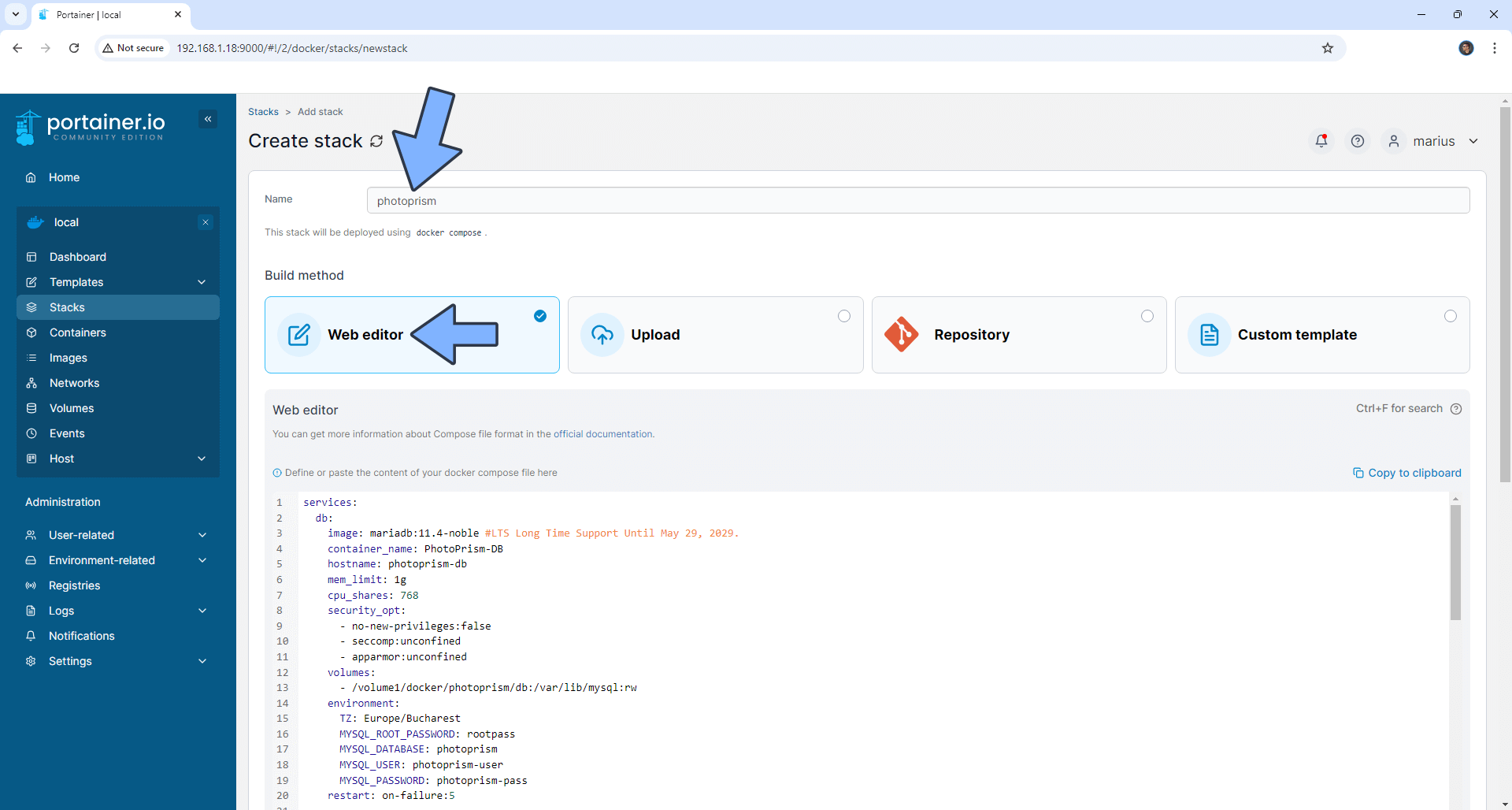
STEP 8
Scroll down on the page until you see a button named Deploy the stack. Click on it. Follow the instructions in the image below. The installation process can take up to a few minutes. It will depend on your Internet speed connection.
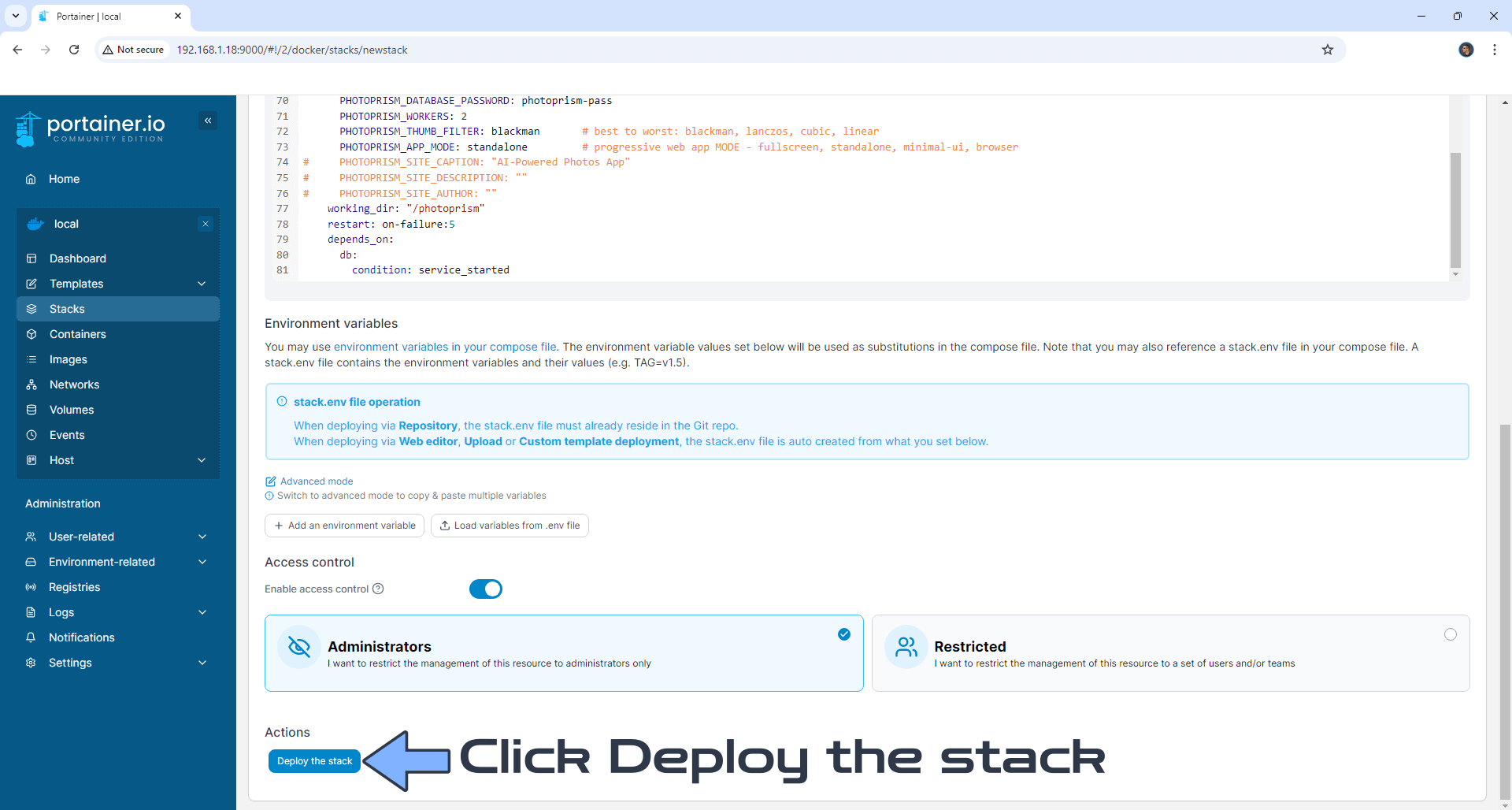
STEP 9
If everything goes right, you will see the following message at the top right of your screen: “Success Stack successfully deployed“.
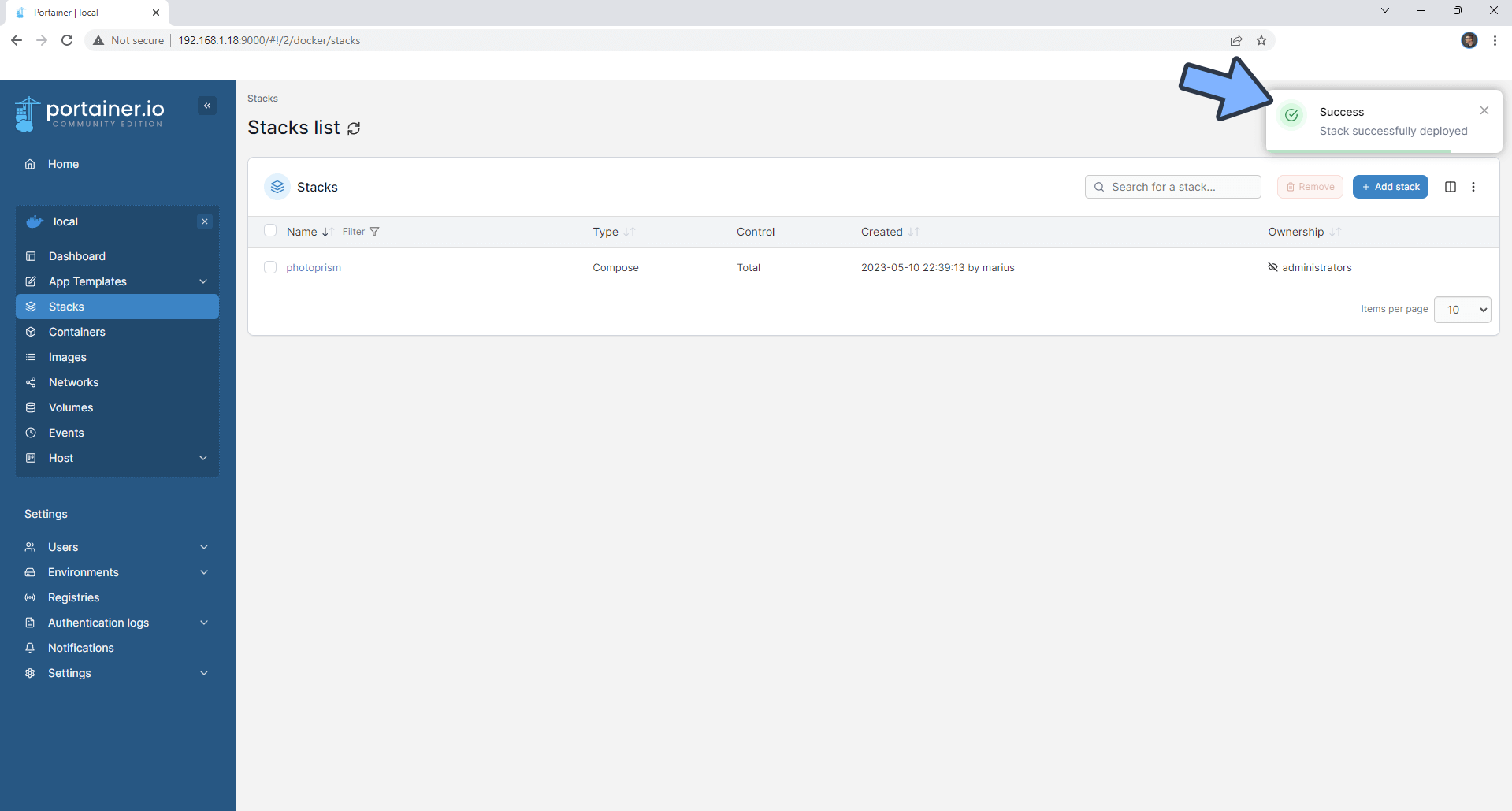
STEP 10
🟢Please Support My work by Making a Donation. Almost 99,9% of the people that install something using my guides forget to support my work, or just ignore STEP 1. I’ve been very honest about this aspect of my work since the beginning: I don’t run any ADS, I don’t require subscriptions, paid or otherwise, I don’t collect IPs, emails, and I don’t have any referral links from Amazon or other merchants. I also don’t have any POP-UPs or COOKIES. I have repeatedly been told over the years how much I have contributed to the community. It’s something I love doing and have been honest about my passion since the beginning. But I also Need The Community to Support me Back to be able to continue doing this work.
STEP 11
The installation process can take up to a few seconds/minutes. It will depend on your Internet speed connection. Now open your browser and type in http://Synology-ip-address:2342 Type in your own Username and Password that you have previously created at STEP 7 then click SIGN IN. Follow the instructions in the image below.
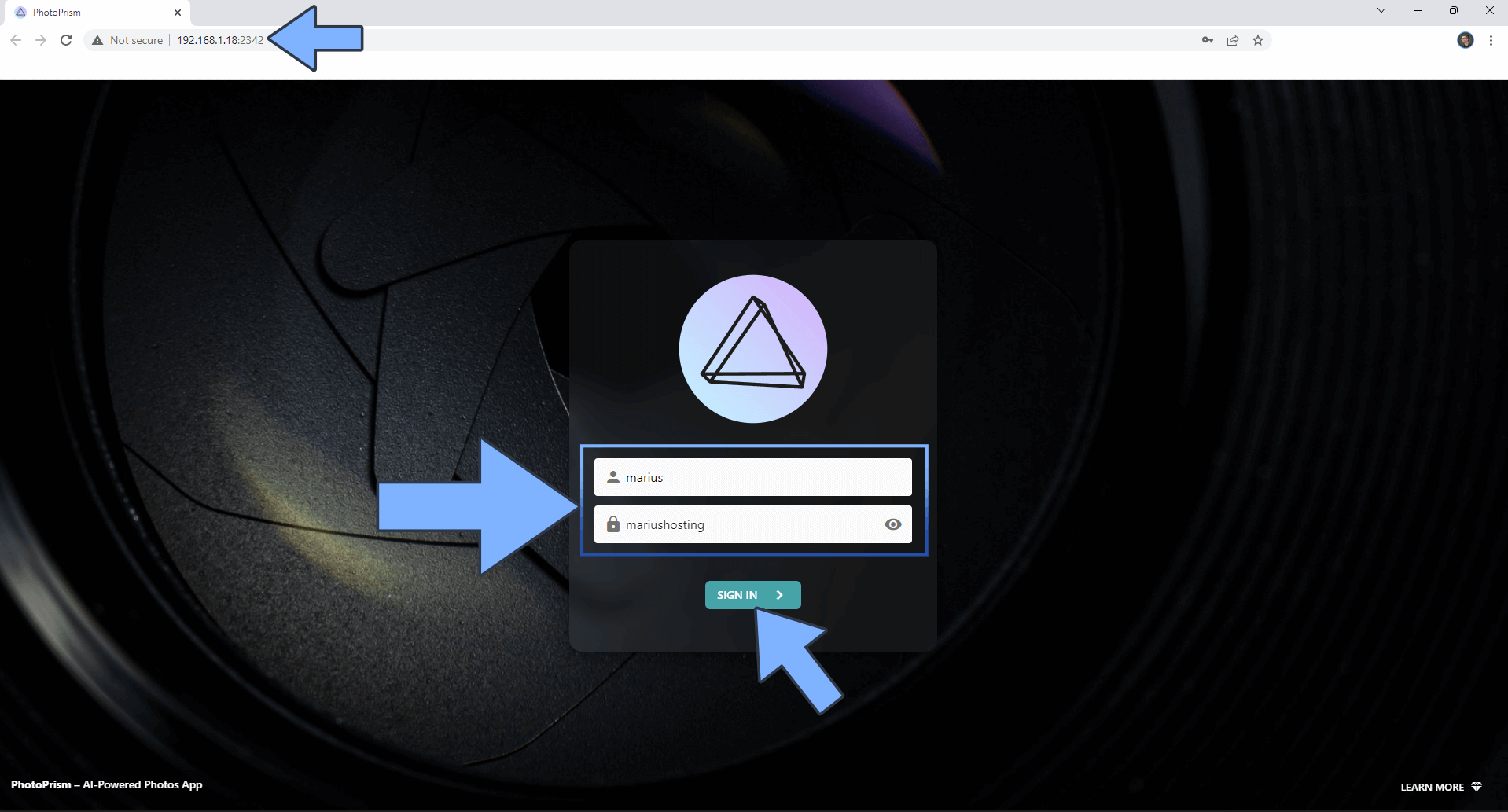
STEP 12
On the left sidebar click on Library. Click START to index your photos. Follow the instructions in the image below.
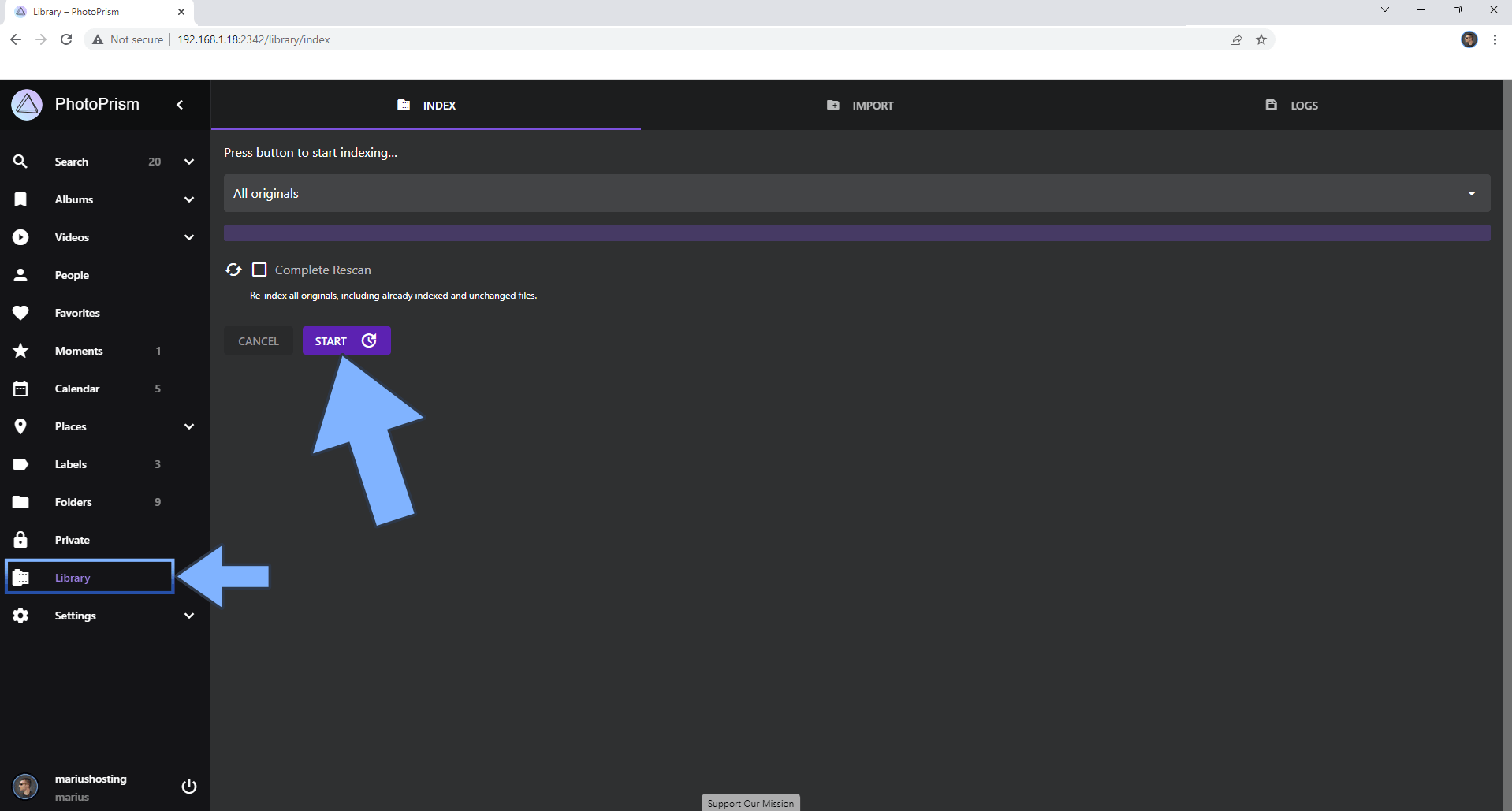
STEP 13
Depending on how many photos you have, it can take up to several hours or days to index all of your pictures.
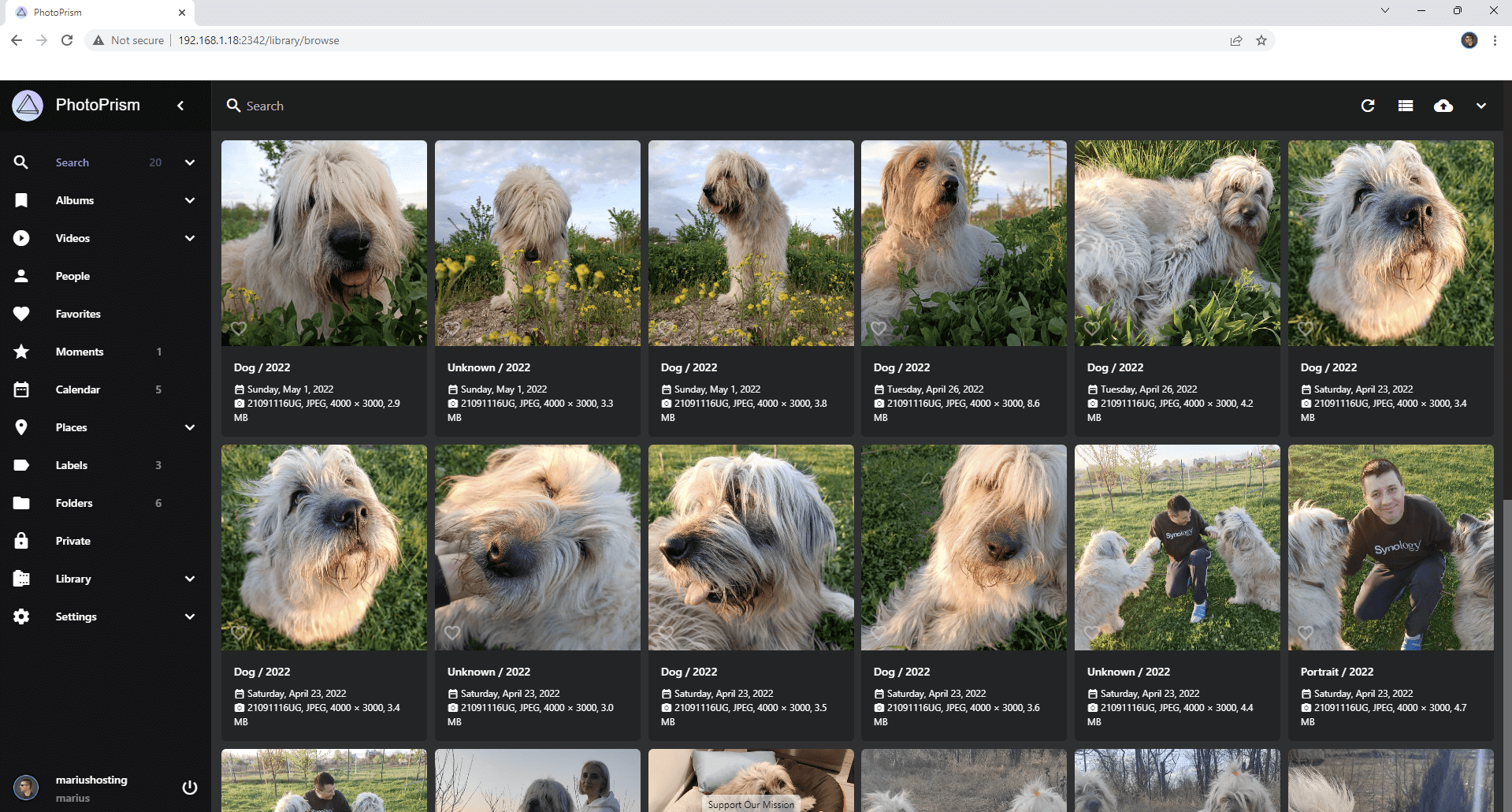
STEP 14
You can also upload your own pictures from your PC. Click the upload icon at the top right of the page. All the uploaded pictures will be uploaded in your own photo path folder named originals that you have previously created at STEP 4. Follow the instructions in the image below.
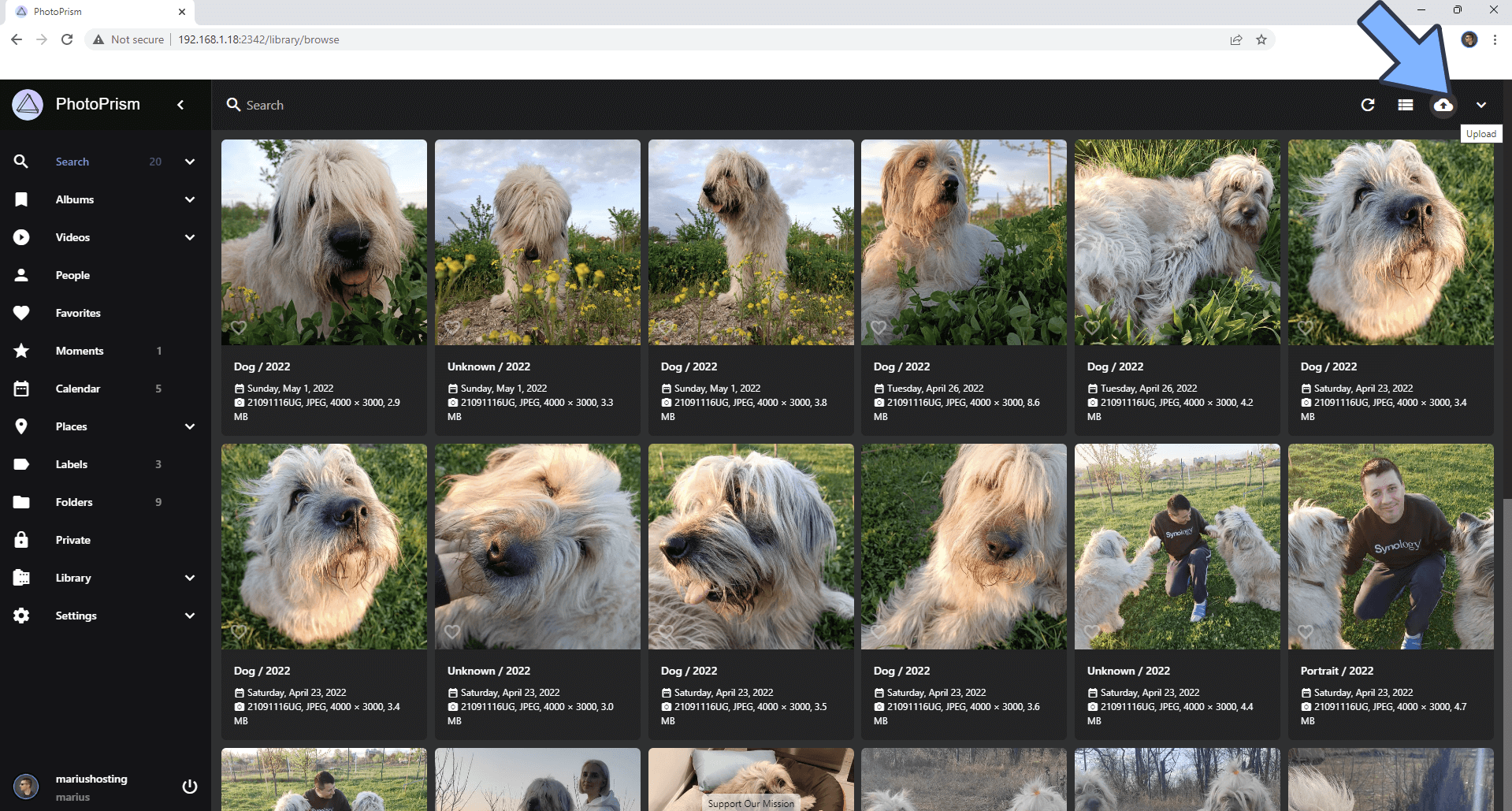
Enjoy PhotoPrism with Portainer!
If you encounter issues by using this container, make sure to check out the Common Docker issues article.
Note: If you want to run the PhotoPrism container over HTTPS, check How to Run Docker Containers Over HTTPS. In order to make PhotoPrism work via HTTPS, it’s mandatory to activate WebSocket.
Note: Can I run Docker on my Synology NAS? See the supported models.
Note: How to Back Up Docker Containers on your Synology NAS.
Note: Find out how to update the PhotoPrism container with the latest image.
Note: How to Free Disk Space on Your NAS if You Run Docker.
Note: I hugely prefer Synology Photos over PhotoPrism.
Note: How to Schedule Start & Stop For Docker Containers.
Note: How to Activate Email Notifications.
Note: How to Add Access Control Profile on Your NAS.
Note: How to Change Docker Containers Restart Policy.
Note: How to Use Docker Containers With VPN.
Note: Convert Docker Run Into Docker Compose.
Note: How to Clean Docker.
Note: How to Clean Docker Automatically.
Note: Best Practices When Using Docker and DDNS.
Note: Some Docker Containers Need WebSocket.
Note: Find out the Best NAS Models For Docker.
Note: Activate Gmail SMTP For Docker Containers.
This post was updated on Friday / May 2nd, 2025 at 5:42 PM
